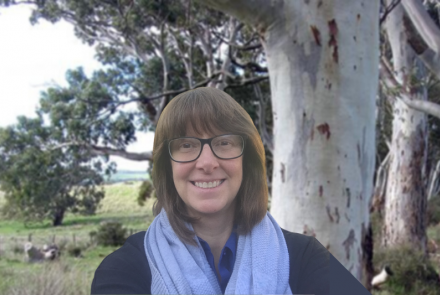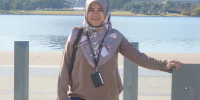
Public inquiries, podcasts, and policy-making
Through her PhD research, Crawford graduate Dr Sue Regan became an expert in the workings of public inquiries and public policy, landing her a job with Volunteering Australia, the country’s peak body for volunteering.
Just before finishing her PhD, Sue started her new role with Volunteering Australia whilst also teaching courses at Crawford School.
Balancing the two jobs and finalising her PhD whilst both the academic and volunteering sectors were hit hard by the outbreak of COVID-19 was very challenging.
“I’m leading the policy and advocacy portfolio at Volunteering Australia and I also combined it with teaching at Crawford.
“The transition to online teaching was hard because it was so quick, but it was also emotionally challenging, because the students were having a difficult time as the pandemic broke out.
“At the same time my new role at Volunteering Australia was also extremely challenging, because the sector was hit quite hard. Organisations had to stand down lots of volunteers, and there were issues around safeguarding their health and safety.”
Sue’s thesis focused on how evidence gets used in public inquiries – what counts as evidence, and what different actors value in evidence.
She found that inquiries are not just about data and formal evidence, and that has implications for the types of engagement activities organisations conduct during public inquiries.
Looking back at her PhD research, Sue said that it was surprising how quickly she was able to put into practice the knowledge and skills she learned in the past years.
“I found that there is a huge diversity in terms of what people value as evidence in public inquiries, some prefer the hard, quantitative pieces of evidence, but there are others that value experiential evidence and the stories.
“Public inquiries provide a space for navigating and reconciling that diversity of evidence.
“I engage quite a lot with public inquiries in my current role at Volunteering Australia. In some ways, it’s been a very quick application of my research. I got this very deep knowledge of public inquiries, and part of our advocacy work is to engage with public inquiries.”
Sue found her interest in public inquiries through working in the area for years, and after joining the former HC Coombs Policy Forum at Crawford School, she knew she wanted to understand more about the theoretical concepts behind public inquiries.
“I first got interested in public inquiries because I had previously worked in the field. I worked on the McClure Welfare Review and in the UK, I worked on the Turner Pensions Commission. So, I had practical knowledge, but I really wanted to understand them better and their role in the public policy process.
“I also worked at the Coombs Policy Forum for a while before starting my PhD, so I had a pretty good idea of what I was getting myself into.
Right now, Sue is working with the volunteering sector on drafting a submission to the Royal Commission into Aged Care Quality and Safety, and is excited to make good use of what she learned during her PhD.
Looking forward, she also hopes to return to teaching a few courses, and continue to be involved in Crawford’s Policy Forum Pod episodes, some of which she presented during her time at the School.
“For my job, I draw on my knowledge from my PhD, but also on the critical thinking skills the research process has helped me develop.
“I’m not going to teach this semester, but I do hope to teach in the future. I’d love to be able to combine practical policy work and working in a university setting. You get these amazing synergies from combining the two.
“I’d love to carry on doing the podcasts – I just think they’re such a fantastic way of engaging with the broader policy community. And they’re such fun as a presenter because you get to talk to such interesting people on a wide range of issues.”
Updated: 18 July 2024/Responsible Officer: Crawford Engagement/Page Contact: CAP Web Team












